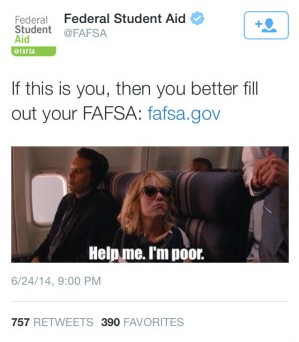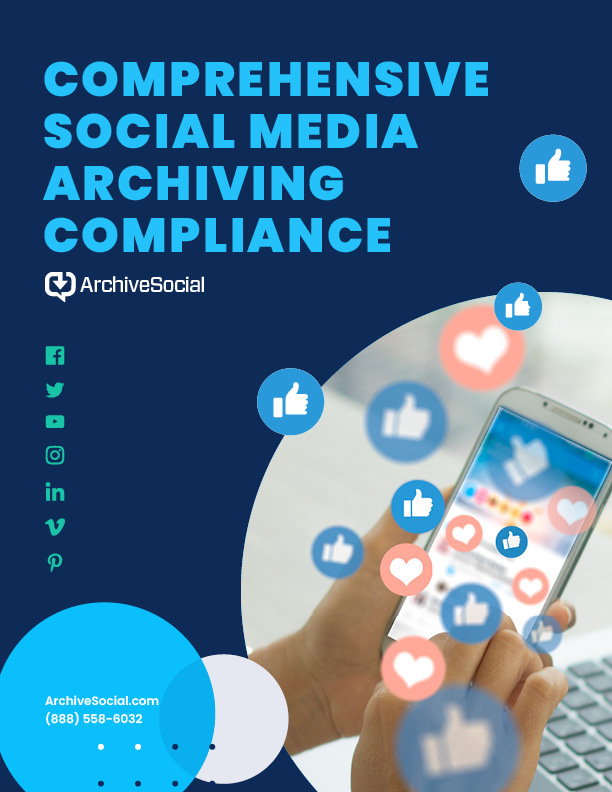Social media is a powerful tool for public agencies, but sooner or later, “Twit Happens”. Our new Tweet Regret blog series will highlight five common pitfalls faced by agencies using Twitter and give practical advice on how to recover from them gracefully.
In our first installment, we’ll look at how hasty communications with citizens can cause unrest, misinform those in need, and hurt relationships with partners and the public.
Last week the federal financial aid agency FAFSA fell into the hasty communication trap when they attempted a bit of humor that offended many of the customers they were trying to reach. The agency used a screenshot of Kristen Wiig from the movie Bridesmaids with the caption “Help me I’m poor” in a tweet that read, “If this is you, then you better fill out your FAFSA.”
The backlash was swift as Twitter users responded with disappointment and anger. The offending post was retweeted hundreds of times and was picked up by national media outlets.
Hi @FAFSA, I'm one of the poor people who needed help to pay for my education. This isn't funny. pic.twitter.com/1HB7yLjNfa
— Lauren D. Thomas (@LaurenDThomas1) June 25, 2014
Dear @FAFSA,
You'll regret that tweet as I regret taking your loans. Much like my regret yours won't go away either
— Alex Zeldin (@Wonko_the_sane_) June 25, 2014
Federal Student Aid (@FAFSA) 'I'm Poor' tweet sparks online backlash http://t.co/ECnL7CdsMs pic.twitter.com/59s2FrS17N
— NBC News (@NBCNews) June 25, 2014
Twitter is a great tool for getting information out to lots of people very quickly, but it does carry some risk. Gaffes can be rapidly spread and magnified through retweets that are outside of your control. When this happens, the best option is to do as FAFSA did and publicly address the mistake and issue an apology as soon as possible.
We apologize for the insensitivity of our previous tweet. Our goal is to make college a reality for all. We're very sorry.
— Federal Student Aid (@FAFSA) June 25, 2014
In another recent example from Austin, TX we see how an agency leveraged the Twitter platform itself to quickly repair relations.
The Tweet
During the SXSW 2014 convention in Austin, Texas, the @austintexasgov Twitter account decided to tweet out a phone number suggesting that the public bring forward potential complaints about their very own police department.
Welcome #SXSXers! We know you’re loving Austin but if you experience a problem with police, let us know. 512-974-9090 http://t.co/179oQN4Thy
— Austin Texas (@austintexasgov) March 11, 2014
The Consequences
Naturally, police officers who had been working long hours to protect the public, and who were in no way creating problems, took offense and were “completely demoralized”. Even though the City of Austin did not intend to undermine its own police operation, the hasty wording of the tweet was seen as divisive and led to significant media coverage.
The Recovery
To their credit, the City of Austin quickly issued a statement apologizing for the tone of the message and utilized the @austintexasgov account to tweet a public apology to the @Austin_Police Twitter account.
.@ArtAcevedo @Austin_Police does an extraordinary job under extraordinary conditions @SXSW Apologies if OPM message gave wrong impression
— Austin Texas (@austintexasgov) March 11, 2014
In situations involving a misunderstanding, it is critical that there is both a genuine apology and an emphatic clarification regarding the intent of the original communication. Austin responded in exactly such a manner. Apologizing via Twitter was also a smart move because it helped address the misunderstanding exactly where it originated.
In general, it is important to ask yourself questions like “Who am I affecting with this tweet?” and “What are the possible outcomes?” before impulsively hitting the tweet button. In addition to thinking about your audience, you must remember your own organization and colleagues. Damaging your own reputation, or your working relationships, is far worse than getting information out a few minutes later. If you take a moment to consider the worst-case interpretation of your words, then in reality, you will almost always avoid it.
This lesson is evident in a statement issued by U.S. Education Department spokesperson Dorie Nolt in response to the misfired FAFSA:
“We are reviewing our process for approving social media content to ensure it reflects the high standards we expect at the U.S. Department of Education.”
In other words, the Department of Education now has first hand experience with tweet regret and is eager to set policies that will help them avoid this mistake in the future.
Next in the series: #Hashtag Gone Wild
Next week in our “Twit Happens” series we’ll discuss what can happen when a hashtag gets used in ways that its originator never intended, and what can be done to regain control.
You can read about all five common Twitter mistakes in the eBook “Twit Happens — Tweet Regrets in the Public Sector”
Has this happened to you? You’re not alone! Share your own stories of Twitter regrets and rockstar recovery in our comments section or on our Facebook page.


